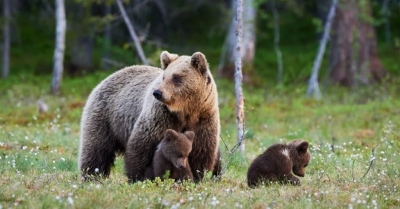
When a baby bear is born, it’s called a cub. Cubs are born to sows, their adult mothers, and boars, their adult fathers. A group of baby bear cubs it’s called a litter, but a group of adult bears is called a sleuth or sloth.
Although adult bears can be very large, cubs are tiny when they are born. A huge polar bear, weighing more than 500 kg, will give birth to cubs weighing about one kilogram – far smaller even than human babies! Baby pandas weigh as little as 85 g. Bear cubs do, however, gain weight and grow very rapidly.
Baby Black Bears are Not Always Black. Some black bear cubs are born with fur that doesn’t exactly match their name. Did you know a black bear’s fur can range from light blonde to blue-gray?
The Kermode, a subspecies of black bear, is also known as the split bear due to its white fur, despite being a black bear. The spirit bear is located in Alaska and is nicknamed the spirit bear because it has ghostly white fur. Bear cubs are on average one pound at birth and can easily fit in the palm of your hand. By the time they’re 6 months old, they weigh about 6 pounds.
As adults, though, they are extremely large. An adult male black bear weighs an average of 400 pounds and an adult female weighs around 200 pounds. In comparison to how large they get to be, bear cubs are tiny!
What do baby bears eat?
Bears are mammals, therefore their young nurses from their mother. While the mother bear is napping away in hibernation, her cubs will nurse until content. Once they’ve made their way out of the den, the cubs will begin weaning from their mom’s milk in the summer and will start tasting their mom’s food once they leave the den. Bears like to eat fish, leaves, bugs, fruit, berries, and much more!
Where do baby bears live?
Cubs are born in dens that their mothers choose for birth and hibernation. They’re born between November and February and stay in the den until Springtime when they will all come out together to see the world for the first time. Once out of the birthing den, the family will move on to find shelter that would better suit their growing family.
Credit : A-Z Animals
Picture Credit : Google




